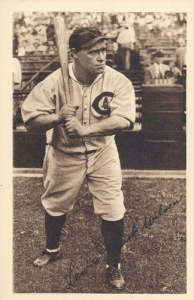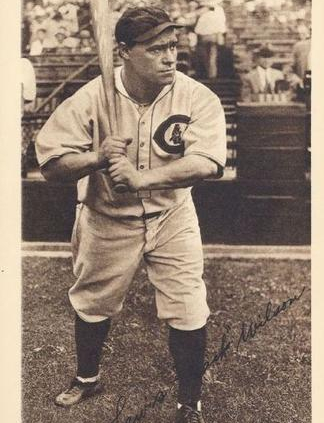July 4, 1929: Wilson-Kolp brawl in dugout mars Independence Day at Wrigley Field
 On the day that Chicagoans were celebrating their country’s independence in 1929, Chicago Cubs slugger Hack Wilson provided fireworks of his own by punching Cincinnati Reds pitcher Ray Kolp in the visitors dugout in the second game of a doubleheader at Wrigley Field.
On the day that Chicagoans were celebrating their country’s independence in 1929, Chicago Cubs slugger Hack Wilson provided fireworks of his own by punching Cincinnati Reds pitcher Ray Kolp in the visitors dugout in the second game of a doubleheader at Wrigley Field.
But the July 4 fisticuffs didn’t stop when the Cubs and Reds left the ballpark. Later that night, Wilson knocked Reds pitcher Pete Donohue to the ground before the teams boarded an eastbound train at Union Station in Chicago.
In the first game of the Independence Day doubleheader, played in the morning, all the excitement had happened between the lines. The Cubs – surging since manager Joe McCarthy moved Wilson into the cleanup spot on June 18 – had taken over first place in the National League with an eight-game unbeaten streak and had beaten eighth-place Cincinnati in the first two games of the series. But in the first game of the holiday twin bill, the Reds pulled out a 9-8 win in a game delayed by rain before the first pitch, then called after eight innings because the teams had agreed to end it at 12:30 P.M.1
With 35,000 fans on hand for the afternoon game, the Reds jumped out to a 3-0 lead in the first inning against Chicago’s Sheriff Blake. Leadoff hitter Evar Swanson, whose eighth-inning single drove in the winning run in the opener, reached on shortstop Woody English’s error. Chuck Dressen singled on a hit-and-run play, sending Swanson to third. Swanson scored and Dressen went to third when Curt Walker singled off second baseman Rogers Hornsby’s glove.
The next batter, George “High Pockets” Kelly, walked to load the bases. Ethan Allen drove in Dressen and Walker with a double to left.
The Reds lost a fourth run when Kelly left third base too early and was called out after Clarke Pittenger flied to left. Still, they extended their lead to 4-0 in the third inning on Walker’s triple and Kelly’s long sacrifice fly.
Held scoreless through two innings by Donohue, the Cubs responded with six runs in the third and never trailed after that. The first batter, Charlie Grimm, walked. After Donohue retired Johnny Schulte and Blake, Norm McMillan doubled to left to score Grimm, and English singled up the middle, plating McMillan.
English scored the Cubs’ third run on Hornsby’s triple into the right-field corner. Cleanup hitter Wilson reached on second baseman Horace Ford’s error, and Hornsby scored the tying run. Kiki Cuyler’s two-run home run into the right-field seats capped the six-run explosion.
The Cubs scored again in the fourth when English drove in Schulte with a two-out single off Donohue, pushing the lead to 7-4.
All hell broke loose in the fifth inning after Wilson collected his third single of the day. “Kolp … yelled from the [Reds] bench that he had doubts about Hack’s gameness,” the Cincinnati Enquirer reported the next day. “To prove the talkative man was in error Hack didn’t hesitate long enough to ask that time be called. He simply sprinted for the Reds dugout, clouted the offender on the jaw and then tried to rip the uniform off everybody who endeavored to restore peace.”2
According to the Chicago Tribune’s account, Wilson was “greeted from the Cincinnati dugout by Kolp, who opened up with a barrage of criticisms of the Cub player and wound up by daring him to come into the dugout.”3
Seconds later, “Wilson bounded off the bag and into the dugout, where he struck Kolp several times before other players intervened and pried them apart. Umpire [Cy] Rigler fought his way through the fans who had clustered around the dugout and ejected Wilson from the game. He was escorted to the Cub dugout by a policeman,” the Tribune added.4
“It took only about a half minute for Ump Rigler to shoo Hack from the foreign dugout,” the Cincinnati newspaper said, “but [Wilson] departed with a smile on his face and the show proceeded just as if nothing unusual had happened.”5
After Wilson was ejected from the game, teammate Cliff Heathcote ran for him. Rube Ehrhardt replaced Donohue on the mound. The Reds reliever then retired Cuyler and Riggs Stephenson, and Heathcote was caught stealing second.
With Jakie May on the mound for the Reds in the sixth, McMillan drove in Grimm and Schulte with a one-out single to give the Cubs a 9-4 lead. In the eighth, McMillan led off with a single to center, but twisted his left ankle while rounding first base. His replacement, Clyde Beck, scored two batters later when Hornsby singled to center.
The Reds’ last run came in the ninth when Dressen singled, advanced to second on English’s second error, and scored on Kelly’s fly ball.
Despite giving up 11 hits and five runs in nine innings, Blake picked up his fifth win of the season against nine losses. Donohue’s record slipped to 3-9; he allowed seven hits and seven runs (only four were earned) in four innings. May surrendered six hits and three runs in three innings of relief.
With the Pittsburgh Pirates sweeping a doubleheader from the St. Louis Cardinals, the Cubs fell into second place, a half-game behind the Pirates. The Cubs’ next stop was in Boston; the Reds were headed to Pittsburgh, then New York City.
That night, with both teams waiting to board an eastbound train at Union Station in Chicago, Wilson told several Reds players that he was coming into their coach car and making Kolp apologize or fight. “At this point, Donohue … warned him that he might not leave the car alive if he so much as appeared,” the Tribune wrote.6
After asking pitcher Donohue why he was interested in the dispute, Wilson punched him on the chin, knocking him down. “By this time, a throng had gathered in time to see Donohue rise and receive another blow on the mouth,” the Tribune recounted.7 Afterward, Cubs and Reds players intervened, and railroad officials separated the two groups as the Reds boarded the train first and then the Cubs.
Reporter Phil Stewart of Collyer’s Eye wrote that Wilson was seen “reclining on the station floor with a bloody nose” after the incident with Donohue.8 “It is not known whether Donohue or some other Cincinnati player smacked him, but as Wilson isn’t inclined to fainting spells it is reasonable to conclude somebody sent him down after he rapped Donohue,” Stewart added.9
There had been other signs of bad blood between the two teams during the four-game series. In the first game, Reds second baseman Hughie Critz was injured in a play at second base with Stephenson. As Critz tried to retire the Cubs baserunner on a force out, Stephenson’s foot hit the bone around Critz’s left knee. A week later, Critz still could not walk and had to stay in bed.10 “I just can’t believe Riggs would jump into me and purposely try to cripple me,” Critz told The Sporting News. “He jumped, all right, but I guess he was just too anxious to beat the play or thought I would get out of the way.”11
Discipline was up to National League President John Heydler. Heydler suspended Wilson for three games for the incident in the Reds’ dugout and fined him $100.
But Heydler cleared Wilson of any wrongdoing at the train station, even though he considered Wilson the aggressor and censured the Cubs’ slugger “for initiating a fight in a public gathering place.”12 After Heydler interviewed eight Reds and six Cubs, including Wilson, he concluded that “the evidence does not sustain the Cincinnati club’s charge that Hack Wilson had made an unjustifiable and brutal assault on pitcher Pete Donohue.”13
Both sides agreed that Wilson and Donohue were 8 or 10 feet apart when Wilson started toward Donohue. “From the conflicting testimony, I can only deduce with certainty that the men had passed insults and that Donohue, in all reasonableness, should have been prepared to defend himself,” Heydler said.14 At the same time, Heydler warned Wilson that he would face serious consequences if he didn’t learn to control himself better.
Looking ahead to a rematch in Cincinnati on August 25, fans wondered if another fight or two would break out at that day’s doubleheader. Wilson predicted that “[I]t will be about as exciting as a Sunday school picnic.”15 Reds manager Jack Hendricks declared that the incident between Wilson and Kolp had been forgotten.
The Cubs’ slugger went 1-for-8 at the plate during the twin bill, which ended an 18-game road trip beginning on August 9 in which Chicago went 13-5 and boosted what was a 6½-game lead over second-place Pittsburgh to an insurmountable 13 games. And with a record 35,432 fans on hand at Redland Field, no fights broke out.16 In fact, the only things thrown were “a few razzing remarks” aimed at Wilson, “who took it all in good humor.”17
Acknowledgments
This article was fact-checked by Kevin Larkin and copy-edited by Len Levin.
Sources
In addition to the sources listed in the Notes, the author used Baseball-Reference.com and Retrosheet.org for pertinent information, including the box score and play-by-play. The author also consulted PaperofRecord.com and Newspapers.com.
https://www.baseball-reference.com/boxes/CHN/CHN192907042.shtml
https://www.retrosheet.org/boxesetc/1929/B07042CHN1929.htm
Notes
1 Tom Swope, “Redlegs Yank Down Cubs,” Cincinnati Post, July 5, 1929: 14; William J. Chipman, “Seesaw Brings Pittsburgh to Head of Column,” Freeport (Illinois) Journal-Standard, July 5, 1929: 12.
2 “Reds Split Double-Header With Cubs – Latter Loses League Lead,” Cincinnati Enquirer, July 5, 1929: 9.
3 “Hack Wilson as Pugilist Has a Big Day,” Chicago Tribune, July 5, 1929: 1.
4 “Hack Wilson as Pugilist Has a Big Day.”
5 “Reds Split Double-Header With Cubs – Latter Loses League Lead.”
6 “Hack Wilson as Pugilist Has a Big Day.”
7 “Hack Wilson as Pugilist Has a Big Day.”
8 Phil Stewart, “Pugilistic Feats of Wilson Are in Doubt,” Collyer’s Eye, July 13, 1929: 5.
9 “Pugilistic Feats of Wilson Are in Doubt.”
10 “Chicago Incidents Arouse Cincy Reds,” The Sporting News, July 11, 1929: 3.
11 “Chicago Incidents Arouse Cincy Reds.”
12 “Chicago Applauds Heydler’s Decision,” The Sporting News, July 18, 1929: 1.
13 “Chicago Applauds Heydler’s Decision.”
14 “Chicago Applauds Heydler’s Decision.”
15 “It May Interest You to Know That,” Chicago Tribune, August 24, 1929: 14.
16 The 35,432 paid admissions exceeded the previous high by more than 300. Cincinnati’s previous high was set during a Sunday game against the New York Giants in 1927. “Double-Header Briefs,” Cincinnati Enquirer, August 26, 1929: 8.
17 “Double-Header Briefs.”
Additional Stats
Chicago Cubs 10
Cincinnati Reds 5
Game 2, DH
Wrigley Field
Chicago, IL
Box Score + PBP:
Corrections? Additions?
If you can help us improve this game story, contact us.


